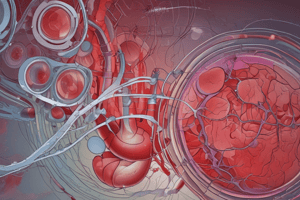Podcast
Questions and Answers
What is the function of Potassium ($K^+$)?
What is the function of Potassium ($K^+$)?
- Regulates heart and muscle function (correct)
- Regulates blood pH
- Regulates oxygen transport in the blood
- Regulates bone density
What are the manifestations of Hypokalemia (K+ below 3.5)?
What are the manifestations of Hypokalemia (K+ below 3.5)?
- High blood sugar, frequent urination, increased thirst
- High blood pressure, rapid heart rate, anxiety
- Elevated body temperature, excessive sweating, muscle cramps
- Flat T wave, ST depression, shallow respiration (correct)
What are the causes of Hypokalemia?
What are the causes of Hypokalemia?
- Fluid loss, diarrhea, diuretics (correct)
- High potassium diet, low aldosterone levels, hyperglycemia
- Sedentary lifestyle, high sodium intake, excessive caffeine consumption
- Excessive potassium intake, kidney disease, alkalosis
What is the critical level for Hyperkalemia (K+)?
What is the critical level for Hyperkalemia (K+)?
What are the manifestations of Hyperkalemia?
What are the manifestations of Hyperkalemia?
What is the function of Sodium ($Na$)?
What is the function of Sodium ($Na$)?
What are the manifestations of Hyponatremia?
What are the manifestations of Hyponatremia?
What is the function of Chloride ($Cl$)?
What is the function of Chloride ($Cl$)?
What are the manifestations of Hypomagnesemia?
What are the manifestations of Hypomagnesemia?
What is the function of Calcium ($Ca$)?
What is the function of Calcium ($Ca$)?
What are the manifestations of Hypocalcemia?
What are the manifestations of Hypocalcemia?
What are the manifestations of Hypercalcemia?
What are the manifestations of Hypercalcemia?
What are the manifestations of Hyperphosphatemia?
What are the manifestations of Hyperphosphatemia?
What are the manifestations of Hypophosphatemia?
What are the manifestations of Hypophosphatemia?
Flashcards are hidden until you start studying
Study Notes
Potassium (K+)
- Helps regulate heart rhythm and muscle contractions
- Crucial for nerve function and muscle contractions
Hypokalemia (K+ below 3.5)
- Manifestations:
- Muscle weakness
- Fatigue
- Constipation
- Abnormal heart rhythms
- Palpitations
- Causes:
- Diuretic use
- Vomiting
- Diarrhea
- Certain medications
- Hormonal imbalances
Hyperkalemia (K+ above 5.5)
- Critical level: above 6.5 mmol/L
- Manifestations:
- Abnormal heart rhythms
- Palpitations
- Muscle weakness
- Fatigue
- Tingling sensations
Sodium (Na+)
- Helps regulate fluid balance and blood pressure
- Crucial for nerve function
Hyponatremia (Na+ below 135)
- Manifestations:
- Nausea
- Vomiting
- Headache
- Fatigue
- Seizures (in severe cases)
Chloride (Cl-)
- Helps maintain fluid balance and pH balance
- Crucial for maintaining blood pressure
Magnesium (Mg2+)
- Helps regulate muscle and nerve function
- Crucial for bone health and energy production
Hypomagnesemia (Mg2+ below 0.7)
- Manifestations:
- Muscle cramps
- Weakness
- Fatigue
- Abnormal heart rhythms
- Seizures (in severe cases)
Calcium (Ca2+)
- Crucial for bone health and muscle function
- Helps regulate heart rhythm
Hypocalcemia (Ca2+ below 2.2)
- Manifestations:
- Muscle cramps
- Twitching
- Numbness
- Tingling sensations
Hypercalcemia (Ca2+ above 2.6)
- Manifestations:
- Weakness
- Fatigue
- Abdominal cramps
- Nausea
- Vomiting
Phosphorus (PO42-)
- Crucial for energy production and bone health
Hyperphosphatemia (PO42- above 4.5)
- Manifestations:
- Weakness
- Fatigue
- Bone pain
- Nausea
- Vomiting
Hypophosphatemia (PO42- below 2.5)
- Manifestations:
- Weakness
- Fatigue
- Confusion
- Seizures (in severe cases)
Studying That Suits You
Use AI to generate personalized quizzes and flashcards to suit your learning preferences.



